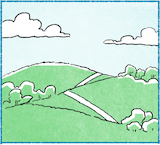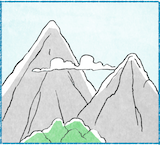

อันนี้คืออี่หยัง อันนี้เป็นพูเขา
พูเขาจั่งใด กะเป็นพูเขาน้อยๆ ดอก บ่ใหญ่ เป็นพูเขา หลือว่าเอิ้นว่าเนินเขาเนาะ เป็น เป็นเนินเขา บ่ใหญ่หลาย เป็นเนินเขาน้อยๆ บ่สูงคักหลายดอก
5
อันนี้คืออี่หยัง อันนี้กะเป็นพูเขา
พูเขาสูงเติบ สูงคัก เบิ่งหละพุ้นหนะ ป๊าด สูงคักสูงแน่ สูงจนฮอดขี้ฝ้าเอาโลด สูงจนขึ้นไปเทิงฟ้าพุ้นหนะ
แล้วพูเขาอันนี้มันแหลมบ่ แหลม เพาะว่าพู ขั้นมันสูงหลาย มันกะสิแหลมขึ้นเลี้ยยๆ ขั้นมันพูเขาน้อยๆ มันกะสิเป็นเนิน บ่ใหญ่บ่แหลมเนาะ อันแต่ว่าอันนี้พูเขามันใหญ่ มันสูง มันกะสิแหลมขึ้นไปเลี้ยยๆๆๆๆๆ เนาะ
แล้วคนสามาดปีนขึ้นไปเทิงปายพูเขานั้นได้บ่ กะแล้วแต่พูเขา แล้วแต่หม้องเนาะ ขั้น ขั้นพูเขาลูกใด หลือว่าพูเขาอันใดสามาดขึ้นไปได้ หลือว่ามีทางขึ้นไป หลือว่าขึ้นได้ง่ายๆ กะสิขึ้นไปได้ แต่ว่าพูเขาใดเป็นตาย้านหลาย หลือว่าบ่สามาดขึ้นไปได้ คนกะบ่สามาดปีนขึ้นไป หลือว่าขึ้นไปเทิงปายพูเขานั้นได้เนาะ
Link to overview page
Link to dictionary
| Isaan | Pronunciation | Tones | Thai | English/Notes |
|---|---|---|---|---|
| อัน | an | M | อัน | 1. thing, object 2. general clf. for objects |
| นี้ | ni: | HF | นี้ | 1. this 2. here |
| คือ | khʉ: | HR | คือ | 1. to be, to resemble, like, as 2. why {บักหล้าคือบ่เก็บโต่ะแน่ = [addressing a young boy] Why haven't you cleared the table?} |
| อี่หยัง | i:-yaŋ | H-M | อะไร | 1. what {นี้คืออี่หยัง = What is this?} {มื้อนี้เจ้าเฮ็ดอี่หยัง = What are you doing today?} {กินเข้างายกับอี่หยัง = What did you have for breakfast?} 2. something, anything, (in negations) nothing {บ่ต้องเฮ็ดอี่หยังอีกเลยนอกจากใส่ปุย = [we] don't need to do anything besides adding fertilizer} |
| เป็น | pen | M | เป็น | 1. to be, to exist 2. to be able to 3. to suffer, sth. happens to 4. เป็นหญัง[...]คือ in initial position: why? {เป็นหญังเขากะคือแปงฟัน = Why is he brushing his teeth?} {เป็นหญังเคี่ยงบินมันคือสิตก = Why is the airplane falling down?} |
| พูเขา | phu:-khao | HR-M | ภูเขา | mountain |
| จั่งใด | jaŋ-dai | H-M | ยังไง, แบบไหน | how, in what manner {บักนาวมันมีลดซาดจั่งใด = Lime fruits have what kind of taste?} {เขาปิดแอจั่งใด = How is he switching off the A/C?} {เทียนใซ้จั่งใด = How's a candle used?} {สิใซ้จั่งใด = how is [it] used?} |
| กะ | ga | M | ก็ | 1. then, consequently 2. also |
| น้อย | nɔ:i | HF | น้อย | 1. few, little 2. small |
| ดอก | dɔ:k | LF | หรอก, ดอก | 1. particle used after a negative, relativizing or explanatory statement to make the sense milder {กินเข้าบ่ บ่กินดอก = Are you going to eat [with us]? No.} {เป็นก้อนสี่เหลี่ยม ก้อนน้อยๆ ดอก = These are cubes, small cubes.} {แล้วกะมีลดคันหนึ่งขี่ผ่านมา เป็นลดเก็งดอก = And there's a car passing, a sedan.} 2. particle used to emphasize (not necessarily a negative) contrast 3. particle used for emphasis {ดอกไม้นี้งามบ่ กะงามอยู่ เบิ่งงามๆ ดอก = Is this flower beautiful? Yes, it's beautiful, it looks beautiful} |
| บ่ | bɔ: | H | ไม่ | 1. no, not 2. question particle, transforming a statement into a question Notes: spelling exception in line with common usage on social media |
| ใหญ่ | ɲai | H | ใหญ่ | large, big |
| หลือ | lʉ: | M | หรือ | or |
| ว่า | wa: | H | ว่า | 1. that, as {คำว่า X = the word X} 2. to say |
| เอิ้น | ə:n | HF | พูด, เรียก | to call, to say {เอิ้นง่ายๆ ว่า = in other words} {คนอี่สานเอิ้นว่า เป็นลูกคนกก = Isaan people call her ลูกคนกก} |
| เนินเขา | nə:n-khao | HR-M | เนินเขา | hill Notes: see also เนิน |
| เนาะ | nɔ | H | เนาะ | final particle: makes the statement softer, looking for agreement |
| หลาย | la:i | M | เยอะ, มาก | many, much, very |
| สูง | su:ŋ | M | สูง | high, tall |
| คัก | khak | H | intensifier: very, very much | |
| เติบ | tə:p | LF | intensifier: very, much {เว้ากันโดนเติบ = to talk a long time} | |
| เบิ่ง | bəŋ | H | ดู | 1. to look at, to see, to watch {เบิ่งโทละทัด = to watch TV} {เบิ่งหนัง = to watch a movie} 2. to guess {เบิ่งซงแล้ว ... = [I] guess / from what it looks like ...} |
| หละ | la | M | แหละ, ล่ะ | 1. auxiliary for emphasis at the end of a phrase 2. auxiliary to create a follow-up question: And what about ... ? {แล้วลดคันที่สองหละ = And what about the second car?} |
| พุ้นหนะ | phun-na | HF-H | นู่นแหละ | auxiliary for emphasis at the end of a phrase Notes: variant of พุ้นหละ |
| ป๊าด | pa:t | HR | โอ้โห | exclamation of surprise {ป๊าด คือมาเก่งแท้ = Wow, [she's] really good/talented!} |
| แน่ | nɛ: | H | แน่, บ้าง | 1. some, somewhat 2. final particle, used to ask for examples (similar to Thai บ้าง at the end of a question) {หม้อใซ้เฮ็ดอี่หยังได้แน่ = What (different things) can a pot be used for?} {น้ำอัดลมซื้อได้อยู่ใสแน่ = Where/in which places can one buy soft drinks?} 3. final particle, when giving examples {มีเทิงส้งแน่ มีเสี้ยแน่ มีเกิบแน่ = there are trousers, shirts, shoes etc.} 4. final particle, used to give a command {ไปปิดหน้าต่างให้แน่ = Close the window!} 5. final particle, acting as an intensifier, especially in the pattern ... คัก ... แน่ {สูงคักสูงแน่ = very high} {ญ้องเฮาคัก ญ้องเฮาแน่ = [he's] praising me a lot} |
| จน | jon | M | จน | 1. poor {คนจน = a poor person} 2. until, such that {เสียงดังเลี้ยยๆ จนคนสิลับ = (phone) it's ringing until [he/someone] answers the call} {ถ้าจน [...] = to wait until [...]} |
| ฮอด | hɔ:t | HF | ถึง | 1. to arrive, to attain {ฮอดจุดหมายปายทาง = (airplane, train etc.) to arrive at one's destination} {มันทันได้ฮอดหกโมงอยู่ = it's not yet 6 o'clock} 2. to, at {ผมญาวฮอดบ่าไหล่เอาโลด = long hair down to the shoulders} 3. about {บ่ได้เว้าฮอด = [I] haven't talked about [this]} {คนที่เฮาเว้าฮอดวั่งหั้นหละ = the person we've just talked about} |
| ขี้ฝ้า | khi:-fa: | LF-LF | เมฆ | cloud {ขี้ฝ้ามีหลายอยู่ ขี้ฝ้ามันมีเต็มท้องฟ้าอยู่ = there are many clouds, there are clouds all over the sky} |
| เอาโลด | ao-lo:t | M-HF | เอาเลย, ทำเลย, จริงๆ | in final position: intensifier {โตส่ำกะทะเอาโลด = [a fish] as large as the pan!} {เกียบเต็มถ้วยเอาโลด = the bowl is almost full!} {ทะนาคานมันสิไปตั้งไว้อยู่ซู่หม้องเอาโลด = banks are everywhere!} |
| ขึ้น | khʉn | LF | ขึ้น | 1. to go up, to increase 2. sun: to rise {ตะเว็นกำลังขึ้น = the sun is rising} 3. more 4. bus/train etc.: to get on, to board {พุโดยสานขึ้นลดไฟเบิดแล้ว = all passengers have boarded the train} |
| ไป | pai | M | ไป | 1. to go 2. auxiliary indicating action extending into the future |
| เทิง | thə:ŋ | HR | บน | 1. on, on top of, at, in {เทิงโต่ะ = at/on the table} {กบมันนั่งอยู่เทิงใบบัว = the frog is sitting on the lotus leaf} {เทิงท้องฟ้า = in the sky} {มันแล่นอยู่เทิงลาง = [the train] runs on rails} {มีคนนั่งอยู่เทิงลดสามล้อสามคน = there are three people sitting in the tuk tuk} 2. up, upward Notes: pronunciation: also realized as ทัง |
| ฟ้า | fa: | HF | ฟ้า | 1. sky {เคี่ยงบินมันกำลังบินขึ้นฟ้า = the airplane is taking off into the sky} 2. color: blue |
| แล้ว | lɛ:o | HF | แล้ว | 1. finished 2. already 3. and then, and next (especially แล้วกะ) 4. auxiliary for past tense |
| มัน | man | HR | มัน | it (also used to refer to people) |
| แหลม | lɛ:m | M | แหลม | sharp |
| เพาะว่า | phɔ-wa: | H-H | เพราะว่า | because |
| พู | phu: | HR | ภูเขา | short for พูเขา = mountain |
| ขั้น | khan | LF | เมื่อ | when, if |
| สิ | si | M | จะ | future tense auxiliary {เขากำลังสิตื่น = he's about to wake up} {สิไปตะหลาด = [I'm] going to the market} |
| เลี้ยยๆ | li:ai | HF | เรื่อยๆ | continuously Notes: pronunciation: also realized as เลื้อยๆ |
| เนิน | nə:n | HR | เนิน | hill Notes: see also เนินเขา |
| อันแต่ว่า | an-tɛ:-wa: | M-H-H | เพียงแต่ว่า | 1. but, however 2. only |
| คน | khon | HR | คน | person, people |
| สามาด | sa:-ma:t | M-HF | สามารถ | can, to be able |
| ปีน | pi:n | M | ปีน | to climb |
| ปาย | pa:i | M | ปลาย | 1. tip, end, extremity {ปายพูเขา = summit of a mountain} 2. of children: youngest {ลูกสาวคนปาย = youngest daughter} |
| นั้น | nan | HF | นั้น | that, there |
| ได้ | dai | HF | ได้ | 1. can 2. to get, to obtain 3. before verb: indicating past tense 4. บ่ได้ + verb: not |
| แล้วแต่ | lɛ:o-tɛ: | HF-H | แล้วแต่ | up to, depending on |
| หม้อง | mɔŋ | LF | ที่, แห่ง, บริเวณ | 1. place, area {หลายที่หลายหม้อง = in many places} {หม้องใดหม้องหนึ่ง = some place} 2. clf. for places |
| ลูก | lu:k | HF | ลูก | 1. child 2. clf. for balls, fruits (lime), mountains |
| ใด | dai | M | ใด | 1. which, that one which, what, how {เขานั่งแบบใด เขานั่งขดตะหมาดอยู่ = How is he sitting? He's sitting cross-legged.} {ตอนใด = when?} 2. whichever, whoever {หม้องใดหม้องหนึ่ง = some place, somewhere} {ขั้นเฮาอยากตื่นญามใด เฮากะตั้งเวลาปุกญามนั้น = If we want to get up at a certain time, we set the alarm to that time} Notes: sentence-final often with a marked rising tone |
| มี | mi: | HR | มี | 1. to have 2. there is |
| ทาง | tha:ŋ | HR | ทาง | 1. way, direction {พุหญิงกะสิไปทางหนึ่ง พุซายกะสิไปอีกทางหนึ่ง = the woman goes one way, the man another way} {ตะเว็นไปทางใด = Where has the sun gone?} {เขาถีบจักกะย๊านไปทางหน้า = he's biking on/onward/forward} {มาเว้า มาว่าเฮาในทางที่บ่ดี = he's scolding [me], he's talking to me improperly} 2. by, through, via etc. {เว้าทางโทละสับ = to talk on the phone} |
| ง่าย | ŋa:i | H | ง่าย | easy, simple, clear |
| แต่ว่า | tɛ:-wa: | H-H | แต่ว่า | 1. but 2. only {ฮู้แต่ว่าเขายืนอยู่พุเดียว = I only know that he's standing there by himself} |
| ตาย้าน | ta:-ya:n | M-HF | น่ากลัว | scary, not safe |